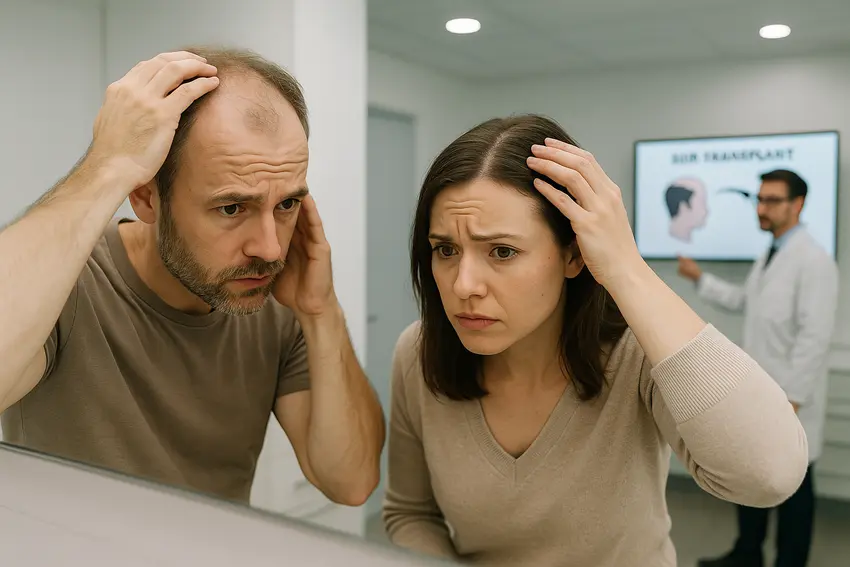Hair loss is a significant concern for many, affecting both men and women at various stages of life. While genetics and aging play a primary role in hair thinning, stress is another major factor that can accelerate hair loss. In this article, we’ll explore how stress affects hair growth and how a hair transplant may offer a longer-lasting solution for many individuals, potentially restoring both your hair and your confidence.
How Stress Contributes to Hair Loss
Stress has a profound impact on overall health, and one of its less obvious effects is on your hair. The body’s stress response triggers the release of hormones like cortisol and adrenaline. These hormones, while crucial for handling stress, can disrupt the normal hair growth cycle if the stress becomes chronic. When this happens, hair follicles may prematurely enter the telogen phase, also known as the shedding phase.
This type of hair loss is called telogen effluvium, and it can result in noticeable thinning and increased shedding. In some cases, research suggests stress may be linked to conditions like alopecia areata, where the immune system mistakenly attacks hair follicles, leading to patchy hair loss. While telogen effluvium is often temporary, its emotional impact can be significant.
The Link Between Stress and Hair Loss
Stress doesn’t just cause temporary hair loss; it can also exacerbate existing conditions like male pattern baldness and female pattern hair loss. These conditions are genetically predisposed, but stress can accelerate their progression, leading to faster thinning and receding hairlines. In some cases, stress might push individuals with a genetic tendency toward baldness into more advanced stages of hair loss sooner than expected.
The cumulative effect of long-term stress, combined with poor sleep, unbalanced nutrition, and lack of physical activity, can weaken hair follicles and make them more vulnerable to shedding. As a result, the body may struggle to produce strong new hair to replace the lost strands. Over time, this can contribute to visibly thinner hair or receding hairlines, creating a cycle where stress and hair loss reinforce one another.
How a Hair Transplant Can Help Combat Stress-Induced Hair Loss
While managing stress is crucial for overall well-being and maintaining healthy hair, a hair transplant may offer a longer-term restoration option for individuals who’ve already lost significant hair due to stress or genetic factors. A hair transplant procedure involves moving healthy hair follicles from a donor area to areas with noticeable thinning. In many cases, transplanted hair can continue to grow naturally, making it a potential solution for visible hair loss.
Follicular Unit Extraction (FUE) is one of the most commonly used techniques. It involves extracting individual hair follicles from the back or sides of the scalp and placing them in areas of thinning or baldness. This method is minimally invasive, typically leaves no linear scars, and often allows for quicker recovery compared to older techniques like Follicular Unit Transplantation (FUT).
With the help of a qualified and experienced surgeon, a hair transplant may help restore a natural-looking hairline and improve hair density. Many individuals report feeling more confident and satisfied with their appearance after the procedure, especially those who have been dealing with hair loss for an extended period.
The Benefits of Online Doctor Consultations for Hair Transplants
In today’s digital age, many clinics offer the option of online doctor consultations, allowing individuals to explore hair restoration procedures from the comfort of their home. These consultations can make it easier to discuss hair loss concerns with a qualified healthcare provider and learn about available treatment options.
Online consultations typically allow you to share photos of your hair loss pattern, discuss your medical history, and ask questions about the procedure. This can help provide a clearer understanding of what to expect before making any decisions. You may also find testimonials or before-and-after images from individuals who have previously undergone treatment, which can offer additional perspective.
In addition to saving time, virtual consultations may help reduce the logistical and emotional stress of in-person visits. Whether you’re exploring FUE, FUT, or other medically supervised hair restoration techniques, an online consultation can be a helpful first step in learning more about your options.
For broader insights into how stress affects overall health — including hair loss — and to explore practical ways to manage it in everyday life, you may find value in reading this general resource on stress management tips for a busy life here.
Managing Stress to Prevent Further Hair Loss
While hair transplant procedures may offer a long-term solution for addressing hair loss, managing stress is essential for supporting healthy hair and preventing further shedding. Stress management techniques, such as relaxation practices, better sleep hygiene, and regular exercise, may help reduce cortisol levels and support overall well-being, which can have a positive impact on hair health.
Incorporating deep breathing, meditation, or yoga into your daily routine may be beneficial for reducing stress. Similarly, maintaining a balanced diet, staying active, and prioritizing sleep are all valuable habits that contribute to physical and emotional health, including conditions that affect the scalp and hair follicles.
If you believe stress is affecting your hair, taking proactive steps to manage it — along with consulting a qualified hair restoration specialist, can help you make informed decisions and potentially improve your overall hair health and quality of life.
Conclusion
Stress-induced hair loss can take a toll on your self-esteem and emotional health. While managing stress is vital to reducing the effects on your hair, a hair transplant may offer a visible improvement in hair density and appearance. Many individuals report feeling more confident after undergoing the procedure. If you’re experiencing hair thinning or hair loss, it’s important to consult with a hair restoration specialist to determine the best course of action.
Additionally, taking advantage of online doctor consultations allows you to get professional advice without leaving your home, helping you make informed decisions about your hair transplant options. Whether through stress management or advanced hair restoration techniques, the right treatment can help you regain both your hair and your confidence.
Disclaimer
This article provides general information about stress-related hair loss and the potential role of hair transplants. It is not intended as a substitute for professional medical advice, diagnosis, or treatment. Always seek the advice of your physician, dermatologist, or qualified healthcare provider with any questions you may have regarding a medical condition or hair restoration treatment.
The information shared here is for educational and informational purposes only. Outcomes from hair transplant procedures may vary based on individual circumstances, and no specific results are guaranteed. Well Health Organic does not endorse or promote any specific clinics, doctors, or procedures mentioned or implied.
We do not take responsibility for the accuracy, completeness, or potential risks of applying the information shared in this article. Readers are encouraged to do their own research and consult licensed professionals before making any health-related decisions.



















